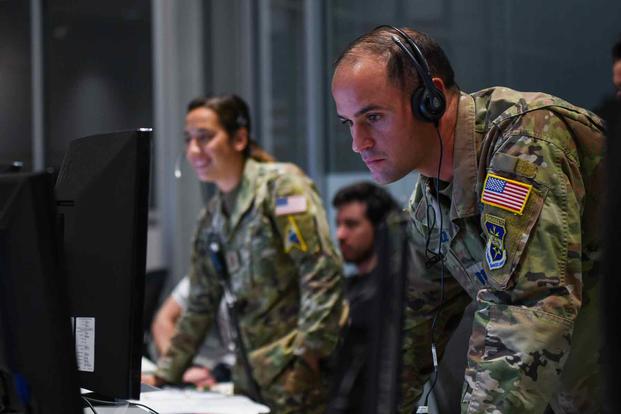Congress is asking for the Space Force to research the idea of allowing Guardians to serve part-time on active duty in the latest defense budget agreement, further delaying a decision on how the service will develop auxiliary forces and delivering a blow to advocates who fought throughout the year for a separate National Guard component.
Lawmakers are asking the Space Force to issue Congress a report by March 1, 2023, on how the idea would work in practice. The request for the report was included in the National Defense Authorization Act agreement brokered between the House and the Senate on Tuesday evening, with the legislation expected to be approved later this month.
The report would address how the part-time model would foster "career flexibility for reserve members of the Space Component ... to move back and forth between active and reserve status for prolonged periods of time across a career," according to the NDAA agreement text.
Read Next: 2023 Military Pay Raise Will Be the Largest in 20 Years
Former Chief of Space Operations Gen. John Raymond and Air Force Secretary Frank Kendall proposed the idea of allowing part-time active-duty service instead of a traditional reserve component or National Guard for the new service. They argued it would be a cost-effective and innovative way to recruit highly talented people from the commercial technology sectors, allowing them to serve their country but also return to their civilian careers.
Ann Stefanek, a spokeswoman for the Department of the Air Force, told Military.com that the service would not comment on pending legislation, but said the idea was conveyed in President Joe Biden's 2023 budget request to Congress to give Guardians options for full- and part-time service.
"If approved, this proposal will establish a new approach to managing reserve component forces by merging active-duty Guardians and Air Force Reserve space professionals," Stefanek said in an emailed statement.
Prior to being formally sworn in as the head of the Space Force last month, Gen. Bradley Saltzman didn't say whether he preferred the part-time active-duty proposal or a more traditional National Guard model during a confirmation hearing in September.
"If confirmed as CSO, I would certainly welcome the opportunity to continue to work with members of this committee and other stakeholders to make sure that we get the right organizational structure and take advantage of these capabilities," Saltzman demurred.
Since the creation of the Space Force in late 2019, there have been several attempts by defense advocates to establish a reserve or National Guard element for the newest and smallest military service branch.
Those efforts have ultimately been delayed, sidelined or stymied, as lawmakers grapple with the costs and logistics of creating another element of the National Guard. President Biden's White House has also offered no support for the efforts for a reserve unit, but have backed the part-time active-duty idea.
The White House Office of Management and Budget issued a statement last year saying it was "strongly opposed" to any efforts to create a Space Guard component, estimating it would increase costs each year by up to $500 million.
That figure has angered National Guard officials, and some outside observers believe the cost could be much less.
Currently, there are 14 Air National Guard units with space-related missions and about 2,000 personnel located in California, Alaska, Arkansas, Hawaii, Florida, Colorado, Ohio, New York and Guam. Lawmakers in those locations want to see the units transferred to the Space Force.
The Adjutants General Association of the United States sent a letter to the Senate Armed Services Committee in late March saying that moving those 14 Air Force units under Space Force's command could cost as little as $250,000, with no need to create new facilities.
Bill Woolf, a retired Air Force colonel and president and chief executive officer of the Space Force Association, said having the National Guard idea included in this year's NDAA seemed like a longshot. But, he believes it'll still be included in the next budget.
"My understanding is it's going to be in the language for next year's NDAA," Woolf told Military.com. "I believe it's a critical requirement for the United States Space Force."
In May, Sens. Marco Rubio, R-Fla., and Dianne Feinstein, D-Calif., introduced a bill that would create a Space National Guard.
The Space National Guard Establishment Act would move Air National Guard members who conduct space missions under the Space Force's command structure. A companion bill by Reps. Jason Crow, D-Colo., and Doug Lamborn, R-Colo., has been introduced in the House.
With the end of the 117th Congress just weeks away and both chambers booked up with other votes, the bill would have to be reintroduced next year.
"Senator Rubio will continue to advocate for the creation of the Space National Guard in the new Congress," a spokesperson for the Florida politician told Military.com.
The new NDAA agreement places the end-strength of the Space Force at 8,600 Guardians, the smallest of all the service branches.
-- Thomas Novelly can be reached at thomas.novelly@military.com. Follow him on Twitter @TomNovelly.
Related: Nominee for Top Space Force Job Grilled over National Guard











